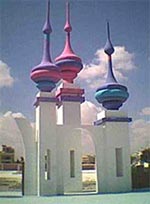|
MERSA MATROUH
 Mersa Matrouh lies 290 km. west of Alexandria and 222 km. from
Sallum. The distance from Cairo to Matrouh is 524 km. It lies on
a bay on the Mediterranean and is distinguished by its seven km. Mersa Matrouh lies 290 km. west of Alexandria and 222 km. from
Sallum. The distance from Cairo to Matrouh is 524 km. It lies on
a bay on the Mediterranean and is distinguished by its seven km.
long beach, which-as all visitors have testified-is one of the
most beautiful in the world.
The beach is famous for its white soft sands and calm
transparent waters, for the bay is protected from the high seas
by a series of rocks forming a natural wave-breaker, with a
small opening to allow light vessels in.
This beach dates back to the days of Alexander, the Macedonian,
when it was known as "Paraetonium" and also as "Amunia". It said
that Alexander the Great stopped there during his historical
expedition to pay tribute, and sacrifice, to the god Amun, at
Siwa, so that he becomes Amun's son and his rule be a historical
continuation of the pharaohs. There are ruins of a temple from
the time of Rameses II (1200 B.C.) in Matrouh.
Most important places / beaches for visit
 Rommel's Hideout:
A cave, hewn in the rock, where Rommel drew up
plans of his military operations. It has now been turned into a
military museum. Rommel's Hideout:
A cave, hewn in the rock, where Rommel drew up
plans of his military operations. It has now been turned into a
military museum.
Ageebah Beach: About 28 km. west of Mersa Matrouh, it is
distinguished by its numerous natural caves and enchanting
scenery.
Al-Abyad Beach: About 20 km. west of Mersa Matrouh beauty
surpasses that of Mersa Matrouh beach.
Marina Ruins-Alamein: An ancient city discovered in 1985, it
comprises temples, tombs baths and nobles' houses, from the Graeco-Roman period. It is the largest archaeological city after
Alexandria. The British Cemetery Thousands upon thousands of
rock-hewn tombstones stand straight rows amidst a fenced garden.
The German Cemetery: It is a fortress like memorial that was
built on a high overlooking the sea.
The Italian Cemetery: It is a high tower fort standing on a high
hill. The walls of the building are covered with marble. |